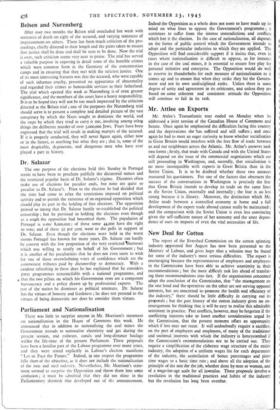Parliament and Nationalisation
There was little to surprise anyone in Mr. Morrison's statement on nationalisation in the House of Commons this week. He announced that in addition to nationalising the coal mines the Government intends to nationalise electricity and gas during the present session, and railways, canals and long-distance haulage within the life-time of the present Parliament. These proposals have been a familiar part of the Labour programme over many years, and they were stated explicitly in Labour's election manifesto " Let us Face the Future." Indeed, in one respect the programme falls short of the objective, as it does nor include the nationalisation of the iron and steel industry. Nevertheless, Mr. Morrison's state- ment seemed to surprise the Opposition and throw them into some confusion ; it must be admitted that they did not shine in the Parliamentary skirmish that developed out of the announcement.
Indeed the Opposition as a whole does not seem to have made up its mind on what lines to oppose the Government's programme ; it continues to suffer from the intense contradictions and conflicts which lost it the election. In the case of nationalisation, all depends on the forms of public control which the Government intends to adopt and the particular industries to which they are applied. The Opposition will find considerable support if it insists that, even in cases where nationalisation is difficult to oppose, as for instance in the case of the coal mines, it is essential to ensure free play for personal initiative and enterprise. The Opposition would do well to reserve its thunderbolts for each measure of nationalisation as it comes up and to ensure that when they strike they hit the Govern- ment and not its own undisciplined ranks. Unless there is some degree of unity and agreement in its criticisms, and unless they are based on some coherent and consistent attitude the Opposition will continue to fail in its task.


























 Previous page
Previous page